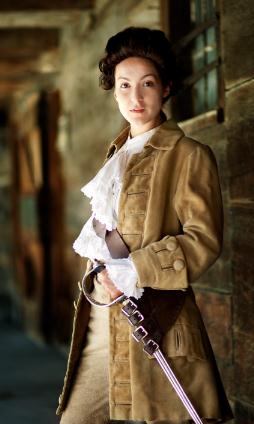
Ashiq Aziz says musical direction for the production was a welcome challenge. Credit: John Lauener
In Handel’s youthful comic cantata Clori, Tirsi e Fileno, two castratos jostle over a fickle soprano. Contemporary takes on the piece – and there are several recordings available, though the work is rarely performed this side of the Atlantic – are inevitably a very queer affair.
Clori, the soprano, remains a woman, but her suitors, Tirsi and Fileno, must be sung by either two women (a soprano and an alto) or a soprano and a counter-tenor, the queerest of male operatic voices. In the Volcano Theatre/Classical Music Consort production that opened Aug 20 at the Gladstone Hotel, music director Ashiq Aziz and stage director Ross Manson, together with the librettist Deborah Pearson, opted for the latter ménage, added the entirely new and contemporary libretto in English, and kept all the glorious Handel music.
A Synonym for Love is about lesbian Theresa (sung by Emily Atkinson), straight yet very femininely voiced Phil (Scott Belluz) and bisexual Clori (Tracy Smith Bessette) who can’t decide between the two.
“I am amazed at the opera voice and what it does to an audience,” Manson says during a break in rehearsals. “But sometimes I see traditional operatic productions and get bored. Maybe it’s the récits in foreign language, which you have to read closely to follow the plot. Sometimes it’s the staging.” The most attractive productions, in his view, combine the music of opera with experimental staging and innovation in text – just the kind of work that the Underground/Opera series programmed by Aziz presents. “I was astonished by the ambition and spirit of Orlando Lunaire. When Ashiq asked me to consider working with the CMC on a ‘very obscure Handel cantanta,’ I was immediately interested.”
For Aziz and the CMC, Handel is an old love. This new site-specific production comes with a set of unique challenges: as the singers move from room to room in the course of the drama, so do the instrumentalists.
“For accompaniment it’s essential to have a keyboard, a plucked string instrument and a bowed string instrument. Our four harpsichords, of course, will stay put, but several other instruments move around,” Aziz says.
Although the score occasionally mirrors the rustic nature of the original libretto, with woodwinds delivering brooks, birds and rustling foliage, Aziz will show how Handel’s music acquires a whole different life in this urban and present-day setting. “Deborah’s libretto is fully independent from the Clori, Tirsi e Fileno text. And today’s audience won’t automatically think of a bird when they hear a recorder — those associations have not survived.” Some of the almost onomatopoeic sections, like the early nightingale aria, remain the same musically, but “will mean in this context something very different.”
The program notes describe Tirsi/Theresa, the lesbian lover, as a firebrand, a sure sign that Tirsi’s original mad, passionate arias will remain equally madly passionate. In many ways Pearson’s libretto is very much the Toronto of today, not the least thanks to the pansexual love intrigue with a same-sex couple at its centre.
“For me there’s something delightfully politically subversive about making that change but not commenting on it,” Manson says. Though the sexes in the story may change, some things clearly don’t. “By the end they all sing that love is impossible. The 18th century, the 21st century . . . love is still as much of a puzzle now as it was then.”
The Deets:
A Synonym for Love
Runs till Fri, Aug 31, 7pm
Gladstone Hotel
Tickets $42/$30 at 1-800-838-3006 or volcano.ca.

 Why you can trust Xtra
Why you can trust Xtra


